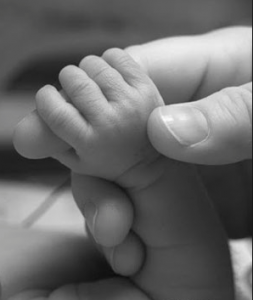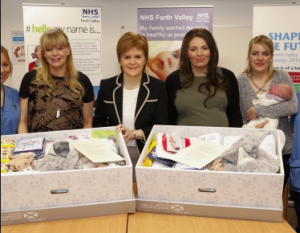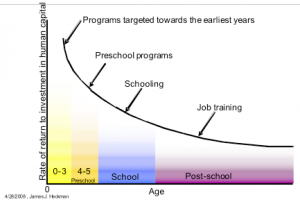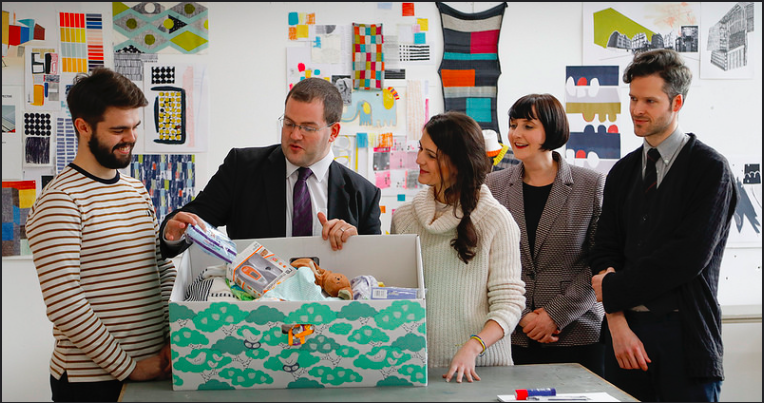The year 2017 has started with a row that might surprise many people. On 1st January, the Scottish Government distributed the first of their new Baby Boxes, designed to support families and babies’ development. Immediately a row erupted on Twitter.
 James McEnaney asked about the evidence that the boxes would fulfil their stated aim of reducing infant mortality. Lucy Hunter Blackburn queried the allocated budget of £6 million, wondering why the figures were not more clearly delineated in the Scottish Parliament’s budgetary documents. Scottish Labour criticised the contents as a missed opportunity to promote breastfeeding. Ian Smart sneered at the poem included in the Box, written by Scotland’s Poet Laureate Jackie Kay, branding her “a woman from Bishopbriggs writing doggerel.” By 4th January, articles had appeared in the mainstream press, criticising the poem itself as “insensitive” because it risked putting pressure on mothers with postnatal depression, who might not experience welcoming feelings toward their babies.
James McEnaney asked about the evidence that the boxes would fulfil their stated aim of reducing infant mortality. Lucy Hunter Blackburn queried the allocated budget of £6 million, wondering why the figures were not more clearly delineated in the Scottish Parliament’s budgetary documents. Scottish Labour criticised the contents as a missed opportunity to promote breastfeeding. Ian Smart sneered at the poem included in the Box, written by Scotland’s Poet Laureate Jackie Kay, branding her “a woman from Bishopbriggs writing doggerel.” By 4th January, articles had appeared in the mainstream press, criticising the poem itself as “insensitive” because it risked putting pressure on mothers with postnatal depression, who might not experience welcoming feelings toward their babies.
Some of you may, at this point, find yourself wondering what a Baby Box is, having missed this debate because you were out enjoying holiday walks with loved ones in the winter sunshine, rather than hunched over social media streams. The Baby Box is an idea that has been imported from Finland, where it has played a role since 1938 in promoting social equality. The box, suitable as a first cot, comes complete with mattress, bedding, clothing, thermometer, nappies, book and other essentials for a baby’s first weeks of life.
In Finland, the scheme (which is accompanied by a parent’s agreement to engage in medical checks) has been credited with helping to reduce infant mortality and benefitting low income families. Such assessments have led to related schemes popping up in rural Canada, the USA, Birmingham and Liverpool, amongst other places. Private companies, including the Baby Box Company and the Finnish Baby Box, have even sprung up, marketing the boxes to individual parents and sometimes working in partnership with London hospitals. Here’s a video of a mum in 2015 delightedly unpacking her box.
Such enthusiasm! What’s not to love? What’s driving the doubtful debate unfurling in Scotland? Several commentators have been quick to offer analyses.
Jason Michel, of the Random Public Journal, attributes it to old class-based prejudices, a “comfortable no-voting social elite” frustrated by seeing Scotland’s “plebs” receiving more free handouts. Joan McAlpine, of the Scottish Daily Record, sees the scheme as a convenient new football in the political game of Labour vs the SNP. James McEnaney, of The Common Space, can’t see strong evidence of effectiveness of the scheme, and Jane Bradley of The Scotsman thinks that a universal programme is a poor use of £6 million in the first place. Julia Rampden, of the New Statesman, sees the debate as a reflection of the social division that still haunts Scottish society, from which Finnish society does not suffer.
 I am choosing to celebrate this row. At its core is a debate about what babies need. It is too seldom that our wider society pays any attention at all to babies’ needs, let alone kicks off a new year with people defending them. I’m cheering…
I am choosing to celebrate this row. At its core is a debate about what babies need. It is too seldom that our wider society pays any attention at all to babies’ needs, let alone kicks off a new year with people defending them. I’m cheering…
…because, ultimately, the Boxes aren’t about poems or parenting or even babies themselves. The Boxes are about building relationships.
That’s what will matter to the babies: what their relationships with their mums and dads feel like. If that’s what matters to the babies, then that’s what needs to matter to us.
Relationships are not abstract things. They are real, lived things, grown out of tiny moments:
- How gentle or rough it feels, being helped into a onesie by your mum.
- How cold or warm it feels, with your nappy being changed around you by your big brother.
- How predictable or surprising it feels, to have a thermometer placed against your body by your grandma.
- How familiar or odd it is to hear your dad’s voice, reading a story out loud.
What matters for a baby is the emotional sense of these tiny moments, these moments that the items in the Baby Box will facilitate: comfortable or uncomfortable, safe or alarming, shared or lonely.
 We now have a huge amount of evidence available about the fundamental importance of relationships in infant development. Babies’ brains develop more rapidly in the first year of life than they ever will again, with approximately 750 connections between nerve cells being formed every second. Those connections are driven largely by babies’ experiences of the world – and especially by their experiences of other people. Relationships shape a baby’s very biology, especially the self-regulatory system that underpins everything from a child’s behaviour to learning to friendships.
We now have a huge amount of evidence available about the fundamental importance of relationships in infant development. Babies’ brains develop more rapidly in the first year of life than they ever will again, with approximately 750 connections between nerve cells being formed every second. Those connections are driven largely by babies’ experiences of the world – and especially by their experiences of other people. Relationships shape a baby’s very biology, especially the self-regulatory system that underpins everything from a child’s behaviour to learning to friendships.
Stories about these processes appear all the time in the press, even though they may use none of the language I’ve chosen here. For example, during December, in the run up to the launch of the Baby Box, one widespread story concerned the latest report from the Dunedin Study, affirming that brain functioning at age 3 can predict behavioural patterns in adulthood. That means that the way children had been loved left lasting biological consequences.
Economics also featured, with Nobel Laureate James Heckman releasing yet another study showing that family support from the age of 8 weeks increases a child’s eventual chances of gaining school qualifications and staying out of prison. That means that the way families had been supported in loving their children had left lasting consequences.
Yet most of the public, parents and non-parents alike, do not realise just how important babies’ early experiences are. They have no idea how fully babies’ brains are tracking patterns in the environment. The ‘Tuning In Report’, released last summer by the US organisation Zero to Three, starkly illuminates this gap. More than half the 2000 parents interviewed didn’t know that babies can sense parents’ moods by the age of 3 months or that language skills start at birth. A quarter of new parents thought that shouting in the home didn’t matter until a child was two years old.
Look closely, slow things down — and we can see babies tuning in to their environment, in the most ordinary, unremarkable of tasks — like nappy changing:
https://www.youtube.com/watch?v=wnL3qDYp1iE
It is overwhelming for most of us to comprehend just how important a parent’s love is. In fact, some authors have argued that all this talk about brain development isn’t helpful to parents. It only makes them more anxious. Instead, they argue, we should simply concentrate on emphasising love and warmth and joy. I want to agree. And yet, I think we live in a society that undervalues precisely the things that help babies grow into healthy, happy children: love and warmth and laughter and play.
The importance of the Baby Boxes being distributed by the Scottish Government derives not from the things they contain. The importance is the way those things will facilitate relationships between babies and parents, reducing the stress on many parents’ ability to meet their babies’ earliest physical and emotional needs. Mark McDonald, Minister for Childcare and Early Years, has pointed to that himself, when he said that “the box contains materials that will promote attachment.” Most of the public, though, has no idea what the word ‘attachment’ means. So let me translate: It’s basically a scientific word for how emotionally safe love feels.
And for many babies in Scotland, love does not feel as safe as we would hope. Over the course of 2017, approximately 10,000 babies will be born into poverty. Poverty creates stress for babies, because it creates stress for their parents. Stress causes human bodies and human brains to change – for the worse. Our whole society pays the later costs of that change, drawn from the budgets for education, health and criminal justice.
 How much do we pay? James Heckman’s analyses suggest that for every £1 invested in early intervention, the returns start at £3 and rise. So it is possible that by spending this £6 million now, the Scottish Government could be saving us £18 million (or some other figure) in future years. Let’s get busy figuring out how to incorporate such calculations into our impact assessments. We so seldom take into account this second part of the equation when it comes to evaluating public spending.
How much do we pay? James Heckman’s analyses suggest that for every £1 invested in early intervention, the returns start at £3 and rise. So it is possible that by spending this £6 million now, the Scottish Government could be saving us £18 million (or some other figure) in future years. Let’s get busy figuring out how to incorporate such calculations into our impact assessments. We so seldom take into account this second part of the equation when it comes to evaluating public spending.
The decision in Oxfordshire to close 44 children’s centres is a terrible illustration of such blinkered thinking. I wonder how long before the ‘savings’ the Country Council thinks they are making come back as other costs, driven by unnecessary suffering.
Early intervention? How can I describe a Box of things as ‘early intervention’? That sounds odd, given that we usually think of ‘intervention’ as a ‘programme’. But that’s my point. A baby doesn’t think of early intervention as a programme. He or she experiences intervention as cuddles and kisses and attention and laughter and play and feeling safe. If the Baby Box helps mums and dads to ‘deliver’ more of these, then the Boxes will have served our newest citizens well – and we will all benefit.
So when you reach your own conclusion about the value of the Baby Boxes, be sure you have taken into account this wider context, missing from the stories offered us this week in the press. The Boxes aren’t just about £6 million spent on other people’s bairns. Parenting is hard. We all end up paying greater costs when we overlook the importance of supporting the people doing the work of connecting.
That’s why I want to do all I can to say to Scotland’s babies of 2017, in the words of our national Makar, Jackie Kay: Welcome wee one.


How crazy that people can’t celebrate the joy any more. From what I understand these boxes are for every mother and baby not just those on “handouts”. How lovely that the mother who has no worries and doesn’t fall into a socially deprived area will be able to access a service that most will believe she doesn’t need. Even though post natal depression doesn’t depended on benefits. She will remember the person who handed her that box and know there is someone who cares to give her this wonderful gift simply for being a mum. How lovely that the mother who has no family support and who can barely feed herself never mind a new baby can relax a little knowing her baby at the very least a has somewhere warm and dry to sleep and that worry is now lifted from her shoulders. I always find it so depressing that those who only focus on the money side of these things cannot see the benefits behind the pound signs or be open minded enough to realise that what we put into the early years benefits society so much in the future and yes money wise as well. I think this idea is amazing and Scotland should be so so proud of themselves
It is vital that society welcomes bairns as equals at birth. This scheme goes a small way to doing just that in my opinion.
Parents can be isolated whatever their circumstances and the message that their baby is held and valued by wider society is so important.
The boxes apparently are used as memory boxes as the child grows in other countries which is a potential added benefit to the babies as they grow here.
The political point scoring is so unecessary over this initiative.
Welcome all of our wee ones.
Two minutes ago I informed my previously uninformed 11 year old step daughter about the baby boxes. Her reply…. . ‘Good for babies? And good for parents? …… no brainer’ I’m more than inclined to agree. From the mouths of bairns. Let’s thrive. ❤️😊
I love the debate too……more talking about babies and their needs is EXACTLY what We need. Inclusive of men, women, children and teenagers, those at are parents and those that are not.
The more we can get the message out there about the need for those vital early attachment promoting behaviours the better. So many parents focus on the material things in preparation for their babies arrival and not on the emotional impact it will have and how to prepare for that.
If the box acts as a prompt for that all well and good, let’s wait and see and hope that it is not used as another way for people to lash out at the Govt. As a HV I welcome any support for those vital early years
Strathclyde University is currently building a sports complex to the tune of £37 million and no conerns raised in the media that this might be a waste of money for the elite that will benefit!
I am fascinated by the Dunedin Study! I had not seen that yet! Many of the adoptive families I have worked with have told me that – as a 3 year old, they could already see their child in jail! Thankfully, we are able to help them do the attachment and therapeutic parenting, and set their child on a different trajectory with a different brain. As you point out though, patterns are set early – early intervention is crucial.